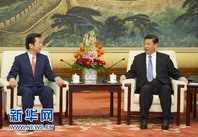 Source: mamoretaiwan.blog.com
Source: mamoretaiwan.blog.com It’s not often that one can give credit to former PM Hatoyama Yukio for actually performing a service that results in an improvement in bilateral relations, however it seems that his visit to China two weeks ago, coupled with visits from New Komeito leader Yamaguchi Natsuo to Beijing on Friday last week and former PM Murayama Tomiichi (he of the 1995 apology for the “invasion” of China and South Korea) have placated the Chinese somewhat. While some might accuse Hatoyama of merely pandering to the prejudices of the CCP (his visit to the Nanjing Massacre Memorial certainly provided China’s media with photo opportunities of a contrite former Japanese PM atoning for Japan’s sins. His description of the Senkaku Islands as a “region of dispute” also markedly differed to the stance taken by successive Japanese governments), his visit did lead to a marked change in attitude by the CCP following the appearance on Weibo of comments in support of the visit by ordinary Chinese (J).
Not a week after that visit, former PM Murayama was in Beijing attending a meeting of the China-Japan Friendship Society in the company of Tang Jiaxuan, former Central Committee member and head of the Chinese Ministry of Foreign Affairs. From the content of media reports, it appears that Tang expressed China’s concerns about the “revisionist” position that the Abe Cabinet seemed to be taking in relation to historical issues, while also noting that dialogue was necessary to control the territorial dispute. Murayama responded by stating that there were no moves to change Japan’s acknowledgement of its past deeds and that Japan was committed to maintaining its relations with China (J).
Meanwhile Xi Jinping, newly elected Secretary General of the CCP, during his meeting with MP Yamaguchi, commented that China was also committed to its relationship with Japan, and that both sides had to “look at the broader picture and push relations forward”. So what we have are Japanese politicians expressing regret for past actions, offering letters from PM Abe to SC Xi urging cooperation, and the Chinese discussing the need for dialogue to overcome the standoff over territorial issues.
The impetus behind this diplomatic activity appears to have been the possibility of the US being dragged into the dispute and concern that this would lead to armed conflict. Following the US Senate’s resolution confirming that the Senkaku Islands are considered to be under Japanese control and therefore subject to the provisions of the US-Japan security treaty (E), the Obama administration appears to have dropped some none-too-subtle hints to Japan that it had to reel in its more inflammatory stance towards China and find a means of working with the CCP to at least address the issues between both sides (which may account for the absence of any reference to China in PM Abe’s inaugural address to Parliament on Monday - E). For their part, the CCP, possibly out of concern of what repeated incursions by Chinese coast guard vessels and aircraft into the area around the islands might provoke, have indicated their willingness to talk (although it hasn’t halted the incursions, the latest of which was on Saturday the 26th (J).
It is possible that the moves by the CCP towards dialogue are a response on the part of China’s diplomatic community to concerns regarding China’s intentions. While hawks in China’s foreign relations think tanks and military institutes have hinted at attempts by the US and Japan to encircle China through increased regional defence ties (E) and threatened retaliation, China’s diplomats have sought to assuage the fears of the region through bilateral talks, perhaps realising (although it seems unlikely that a state with China’s heritage would fail to observe foreign reactions to its actions) that belligerence on the part of a rising power provokes alarm, alarm that could in turn affect China’s influence in bodies such as the UN and the willingness of other states to pursue FTAs with China vital to economic growth (and in the current global economic climate, this is a pressing issue for an export-driven economy like China’s).
Nevertheless, after weeks of bluster, claim, counter-claim, and thinly veiled threats, China and Japan are at least sounding out the other for dialogue. Whether this trend will then extend to states surrounding the South China Sea, or South Korea, or Taiwan, is unknown, although the absence of a formal defence alliance between these states and the US makes the prospect of a compromise less likely.
 RSS Feed
RSS Feed